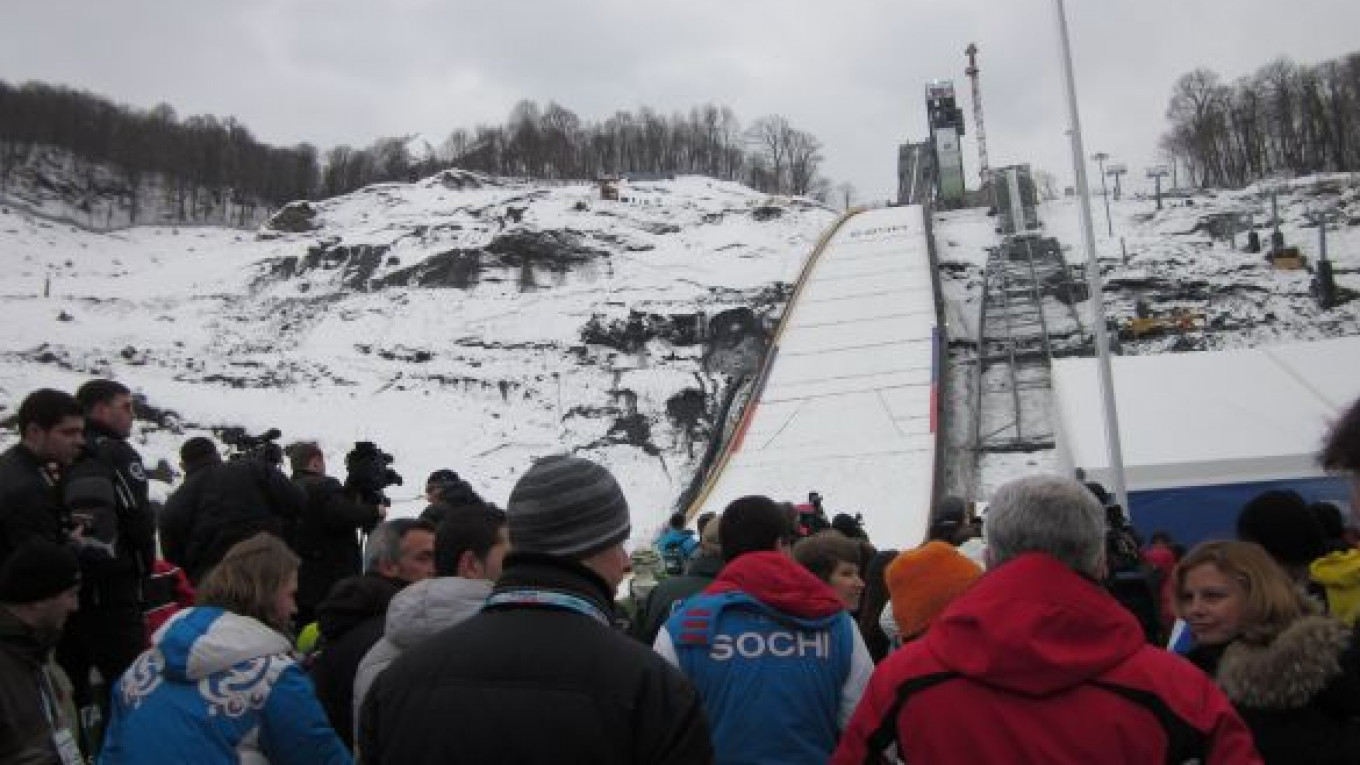KRASNAYA POLYANA, Krasnodar Region — Female ski jumpers will write a new chapter in the sport when they make their Olympic debut at the 2014 Winter Games in Sochi.
"It will be a special occasion not only for the competitors but for all of us involved in the sport of ski jumping," Norway's Torgeir Nordby, a technical delegate for the International Ski Federation, said at the opening of the Olympic ski-jumping complex in Krasnaya Polyana.
Nordby, who has been involved in the sport for nearly three decades, said he is glad to see women finally being allowed to compete at the Olympics on equal terms with men.
"You don't need to ask me that question," he said. "My daughter played for Norway's national soccer team at the 2008 Beijing Games, so I would love to see women ski jumpers also getting a chance to take part in the Olympics.
"In a way, the women's ski jumping is more exciting than the men's because it's often unpredictable," he said. "Women obviously don't have as many top jumpers as men do, but they have improved dramatically in a very short time."
Krasnaya Polyana, once a sleepy mountain village some 70 kilometers from central Sochi, will host all the outdoor Olympic events: bobsled, luge, alpine and cross-country skiing, ski jumping and the biathlon.
While the Alpine World Cup was attended by a number of high-profile VIPs, including Russian President Dmitry Medvedev, the opening of the ski-jumping complex was relatively low-key.
Unique Hill
Only about two dozen, mostly junior-team jumpers turned out for the inaugural Cup of Russia at the Large Hill last month.
Nevertheless, Nordby called the complex, appropriately named the Russian Hills, one of the best in the world.
"It's unique in many ways," he said, pointing to the 125-meter hill. "Every four or five years, our sport undergoes changes in terms of equipment as well as the design of the hill. New equipment gives jumpers more power [and] higher speed, so they fly longer."
"Then, location," he continued. "The wind is a crucial factor in ski jumping. A slight change in direction from a tailwind to headwind can make a difference of up to 20 meters in distance, so it's very important to have a good location. This hill is ideally placed in terms of wind currents. It's well protected from both sides by the mountain ridge."
While several Olympic venues, such as the bobsled track, are being built with the help of the federal government, the ski-jumping complex was financed by private investors, such as Sberbank, the country's largest bank.
"This complex is mainly a social project for us. It's hard to make any money off it," developer Yevgeny Kaplun said. "We've already spent about half of the 4 billion rubles ($132 million) that was allocated for it."
Sberbank is also building a number of high-class hotels in the area, which will become a media village during the Olympics.
The whole project will cost about $1.3 billion, Kaplun said.
Kremlin Order
A source familiar with the project said it was an order from the Kremlin.
"Basically, they were told, 'if you want to build hotels and condominiums here, you must also build the ski jump,'" he said.
After the Olympics, the Russian government plans to turn Krasnaya Polyana into a world-class ski resort to rival Switzerland's St. Moritz or France's Courchevel.
"In two years, you won't recognize this place," Kaplun said.
Two years seemed like an eternity for 20-year-old Ilmir Khazetdinov, who set the Large Hill's record with a 139-meter jump to win the first test event.
"I can't wait to get a chance to jump in a real competition here. You can really fly on this hill," he said. "It would be a dream to compete in the first Winter Olympics held in Russia. I still have a lot to learn in this sport, but I'm going to give my best effort to make the Olympic team."
Russia's ski-jumping head coach, Alexander Arefyev, was equally excited.
"We've waited almost 40 years for this, to finally have a chance to train on a modern, world-class hill," Arefyev said with a big smile. "As (Olympic) hosts, we'll have an advantage training here year-round. Then, in two years, we'll be able to compete with the best in the world: the Austrians, the Swiss, the Norwegians."
A Message from The Moscow Times:
Dear readers,
We are facing unprecedented challenges. Russia's Prosecutor General's Office has designated The Moscow Times as an "undesirable" organization, criminalizing our work and putting our staff at risk of prosecution. This follows our earlier unjust labeling as a "foreign agent."
These actions are direct attempts to silence independent journalism in Russia. The authorities claim our work "discredits the decisions of the Russian leadership." We see things differently: we strive to provide accurate, unbiased reporting on Russia.
We, the journalists of The Moscow Times, refuse to be silenced. But to continue our work, we need your help.
Your support, no matter how small, makes a world of difference. If you can, please support us monthly starting from just $2. It's quick to set up, and every contribution makes a significant impact.
By supporting The Moscow Times, you're defending open, independent journalism in the face of repression. Thank you for standing with us.
Remind me later.






